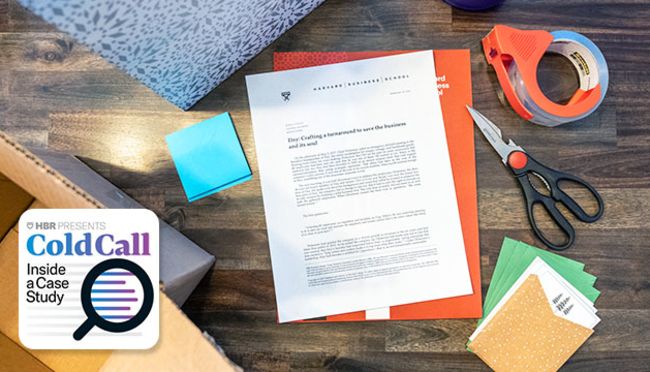Performance Improvement →
→

- 06 Oct 2023
- Book
Yes, You Can Radically Change Your Organization in One Week
Skip the committees and the multi-year roadmap. With the right conditions, leaders can confront even complex organizational problems in one week. Frances Frei and Anne Morriss explain how in their book Move Fast and Fix Things.

- 22 Mar 2022
- Cold Call Podcast
How Etsy Found Its Purpose and Crafted a Turnaround
Etsy, the online seller of handmade goods, was founded in 2005 as an alternative to companies that sold mass-manufactured products. The company grew substantially, but remained unprofitable under the leadership of two early CEOs. Ten years later, Etsy went public and was forced into a new arena, where it was beholden to stakeholders who demanded financial success and accountability. Unable to contain costs, the company was almost bought out by private equity firms in 2017—until CEO Josh Silverman arrived with a mission to save the company financially and, in the process, save its soul. Harvard Business School professor Ranjay Gulati discusses the purpose-driven turnaround Silverman and his team led at Etsy—to make the company profitable and improve its social and environmental impact—in the case, “Etsy: Crafting a Turnaround to Save the Business and Its Soul.” Open for comment; 0 Comments.

- 09 Nov 2021
- Research & Ideas
The Simple Secret of Effective Mentoring Programs
The employees who need guidance most rarely seek it out. New research by Christopher Stanton sheds light on what companies stand to gain from mentorship programs that include everyone. Open for comment; 0 Comments.

- 20 Oct 2020
- Sharpening Your Skills
Steps to Help You Get Out of Your Own Way
These research-based tips will help you slow down, fight the fog, and improve both your home life and work life. Open for comment; 0 Comments.

- 01 Jul 2020
- Working Paper Summaries
Scaling Up Behavioral Science Interventions in Online Education
Online courses can lack support structures that are often bundled with traditional higher education. Short pre-course interventions can have short-term benefits, but more innovation throughout the course is needed to have sustained impact on student success.

- 12 Nov 2018
- Research & Ideas
'Always On' Isn't Always Best for Team Decision-Making
Is it possible for teams to communicate too frequently? Research by Ethan Bernstein and colleagues suggests that groups that meet less often may be better at problem-solving. Open for comment; 0 Comments.

- 09 Apr 2018
- Sharpening Your Skills
The Dark Side of Performance Bonuses
To motivate workers, employers often turn to incentives such as money or recognition. What's become clear is that these programs can also result in unintended consequences—like a financial crisis. Open for comment; 0 Comments.

- 16 Oct 2017
- Working Paper Summaries
Healthy Business? Managerial Education and Management in Healthcare
A hospital's proximity to a university supplying both business and clinical education is associated with higher management practice scores and better clinical outcomes.
- 05 May 2014
- Research & Ideas
Reflecting on Work Improves Job Performance
New research by Francesca Gino, Gary Pisano, and colleagues shows that taking time to reflect on our work improves job performance in the long run. Open for comment; 0 Comments.
- 23 Oct 2013
- Research & Ideas
Overcoming Nervous Nelly
In situations from business negotiations to karaoke, Alison Wood Brooks explores the harmful effects of anxiety on performance—and how to combat them. Closed for comment; 0 Comments.
- 19 Dec 2012
- Research & Ideas
How to be Extremely Productive
Professor Robert Pozen discusses his new book, Extreme Productivity: Boost Your Results, Reduce Your Hours, in which he shares performance-enhancing tips on everything from better sleep on overnight business flights to dealing with employees' mistakes. From the HBS Alumni Bulletin. Closed for comment; 0 Comments.
- 27 Aug 2012
- Research & Ideas
Employee-Suggestion Programs That Work
The key to operating a successful employee-suggestion program is to stop spending so much time on big-bang projects and focus on solving "low-hanging-fruit" problems. Research by Anita L. Tucker and Sara J. Singer. Closed for comment; 0 Comments.
- 31 Oct 2011
- Research & Ideas
The Most Powerful Workplace Motivator
When evaluating compensation issues, economists often assume that both an employer and an employee make rational, albeit self-interested choices while working toward a goal. The problem, says Assistant Professor Ian Larkin, is that the most powerful workplace motivator is our natural tendency to measure our own performance against the performance of others. Open for comment; 0 Comments.

- 06 Sep 2011
- Research & Ideas
How Small Wins Unleash Creativity
In their new book, The Progress Principle: Using Small Wins to Ignite Joy, Engagement, and Creativity at Work, authors Teresa M. Amabile and Steven J. Kramer discuss how even seemingly small steps forward on a project can make huge differences in employees' emotional and intellectual well-being. Amabile talks about the main findings of the book. Plus: book excerpt. Key concepts include: Of all the factors that induce creativity, productivity, collegiality, and commitment among employees, the single most important one is a sense of making progress on meaningful work. Seemingly small signs of progress will induce huge positive effects on employees' psyches. On the other hand, seemingly small setbacks will induce huge negative effects. The catalysts that induce progress include setting clear goals; allowing autonomy; providing resources; giving enough time-but not too much; offering help with the work; learning from both problems and successes; and allowing ideas to flow. Closed for comment; 0 Comments.
- 20 Sep 2010
- Research & Ideas
Power Posing: Fake It Until You Make It
Nervous about an upcoming presentation or job interview? Holding one's body in "high-power" poses for short time periods can summon an extra surge of power and sense of well-being when it's needed, according to Harvard Business School professor Amy J.C. Cuddy. Closed for comment; 0 Comments.
- 28 Jun 2010
- HBS Case
Cincinnati Children’s Hospital Medical Center
A recent Harvard Business School case by HBS professors Amy C. Edmondson and Anita Tucker explores how one hospital implemented its own version of health-care reform, taking overall performance levels from below average to the top 10 percent in the industry. From the HBS Alumni Bulletin. Key concepts include: The case offers valuable takeaways for future managers of any complex service organization. A key takeaway for students is the power of transparency as a mechanism for change. Benchmarking themselves to an internal standard helped the group get beyond rationalizing poor performance as an unavoidable consequence of the complexity of patient care. Closed for comment; 0 Comments.

- 28 Aug 2008
- Working Paper Summaries
How Can Decision Making Be Improved?
While scholars can describe how people make decisions, and can envision how much better decision-making could be, they still have little understanding of how to help people overcome blind spots and behave optimally. Chugh, Milkman, and Bazerman organize the scattered knowledge that judgment and decision-making scholars have amassed over several decades about how to reduce biased decision-making. Their analysis of the existing literature on improvement strategies is designed to highlight the most promising avenues for future research. Key concepts include: People put great trust in their intuition. The past 50 years of decision-making research challenges that trust. A key task for psychologists is to identify how and in what decision-making situations people should try to move from intuitive, emotional thinking to more deliberative, logical thinking. The more that researchers understand the potentially harmful effects of some biased decision-making, the more important it is to have empirically tested strategies for reaching better decisions. Closed for comment; 0 Comments.
- 27 Nov 2006
- What Do You Think?
What’s to Be Done About Performance Reviews?
What can we do to make performance reviews more productive and less distasteful? Should their objectives be scaled back to just one or two? Should they be disengaged from the determination of compensation and, if so, how? Closed for comment; 0 Comments.
- 16 Apr 2001
- Research & Ideas
Breaking the Code of Change
How can firms maximize economic value while developing their organizational capabilities? In a corporate environment where change is constant, business leaders are continually challenged by this dilemma. In this excerpt from "Resolving the Tension between Theories E and O of Change," from Michael Beer and Nitin Nohria's Breaking the Code of Change, the authors present a framework toward "an integrative theory of change." Closed for comment; 0 Comments.

Humans vs. Machines: Untangling the Tasks AI Can (and Can't) Handle
Are you a centaur or a cyborg? A study of 750 consultants sheds new light on the strengths and limits of ChatGPT, and what it takes to operationalize generative AI. Research by Edward McFowland III, Karim Lakhani, Fabrizio Dell'Acqua, and colleagues.